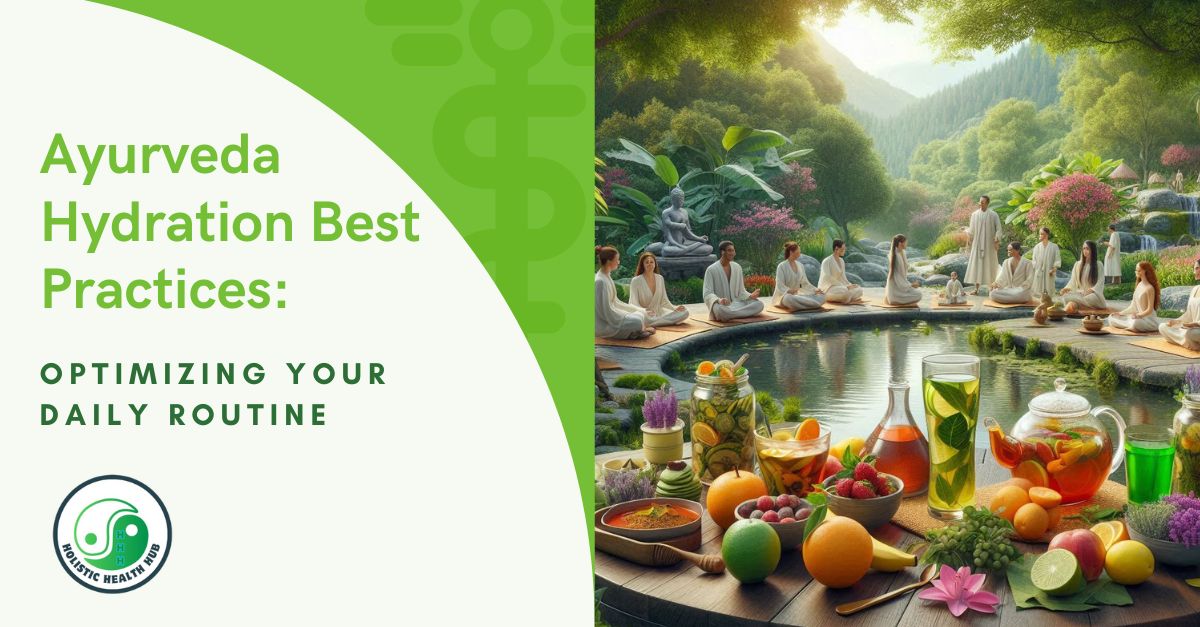Hydration is a crucial aspect of overall health, and Ayurveda, the ancient system of natural healing from India, offers time-tested guidelines to optimize your hydration routine. Here, we explore the best Ayurveda hydration best practices, especially in the morning, according to Ayurvedic principles.
1. Start Your Day with Hot Water
Begin your morning with approximately 12 oz (8-16 ounces) of hot water. This practice helps kickstart digestion, flush out toxins (known as ama), and prepare your body for the day ahead. According to Ayurveda, hot water enhances the body’s ability to eliminate waste and promotes overall health. Ensure you do this immediately after waking up and cleaning your teeth and tongue, but before consuming any other food or beverage.
2. Enhance with Lemon or Lime
For added benefits, squeeze fresh lemon or lime into your hot water. Lemon is rich in vitamin C and antioxidants, which aids in alkalizing the body and boosting the immune system. Lime juice is particularly beneficial for Pitta types, helping to balance their fiery nature.
Click here for CBN sleep gummies
3. Sip, Don’t Chug
When drinking water, take small sips rather than gulping it down quickly. This practice allows your body to absorb the water more effectively and prevents indigestion. Sipping water mindfully can also enhance your hydration experience and ensure your body gets the maximum benefit.
4. Drink at Room Temperature or Warm
Ayurveda recommends drinking water at room temperature or slightly warmer. Warm water can help improve digestion, boost metabolism, and promote detoxification. The recommended water temperature can vary based on your body type (dosha):
- Pittas benefit from cool water to balance their inner heat.
- Lukewarm water is ideal for Vatas.
- Even warmer water is best for Kaphas, who have a cool-natured disposition.
5. Drink According to Your Dosha
Ayurveda suggests tailoring your water intake based on your dosha:
- Vata Types: 8-10 cups daily
- Pitta Types: 6-7 cups daily
- Kapha Types: 5-6 cups daily
Ayurveda Hydration Best Practices according to Vata Types
In Ayurveda, individuals are classified into three primary body types or doshas: Vata, Pitta, and Kapha. Each dosha has unique characteristics and needs, including different hydration requirements. Let’s delve into the details:
Vata Types
Vata dosha is associated with air and ether (space) elements. People with a dominant Vata dosha tend to be energetic, creative, and flexible, but they may also experience dryness, anxiety, and digestive issues.
Hydration Needs: 8-10 cups daily Vata types require more water to counteract their dry and light nature. Drinking 8-10 cups of water daily helps keep their skin hydrated, supports digestion, and maintains overall balance. Warm or room-temperature water is ideal for Vata individuals as it soothes their often cold and dry constitution.
Pitta Types
Pitta dosha is associated with fire and water elements. Individuals with a dominant Pitta dosha are usually intense, determined, and have a strong digestion, but they may also struggle with inflammation, anger, and overheating.
Hydration Needs: 6-7 cups daily Pitta types need moderate hydration to balance their fiery nature. Drinking 6-7 cups of cool or room-temperature water daily helps keep their body temperature in check, prevents overheating, and supports their metabolism. Adding a squeeze of lime or lemon can further enhance the cooling effect for Pitta individuals.
Kapha Types
Kapha dosha is associated with earth and water elements. People with a dominant Kapha dosha are typically calm, steady, and strong, but they may also experience sluggishness, weight gain, and congestion.
Hydration Needs: 5-6 cups daily Kapha types require less water compared to Vata and Pitta doshas. Drinking 5-6 cups of warm or hot water daily helps stimulate their metabolism, prevents water retention, and supports detoxification. Warm water is especially beneficial for Kaphas as it counteracts their cool and heavy nature.
By tailoring your hydration habits to your dosha, you can ensure that your body receives the appropriate amount of water it needs to maintain balance and optimal health. Remember, these guidelines are flexible and should be adjusted based on individual needs, climate, and activity levels.
This personalized approach ensures you are hydrating in a way that supports your unique constitution.
6. Consider the Season and Environment
Adjust your water intake based on the season and your specific environment. For instance, a Kapha individual living in a hot, dry climate might need more water than usual to stay adequately hydrated. Being mindful of these factors helps you stay balanced and healthy year-round.
7. Morning Hydration for Optimal Health
Drinking water first thing in the morning jumpstarts your metabolism and helps flush out toxins from your body. This practice can lead to increased alertness, improved brain function, and overall better health. By starting your day with proper hydration, you set a positive tone for the rest of the day.
Conclusion: Ayurveda Hydration Best Practices
Hydrating according to Ayurveda hydration best practices is more than just quenching your thirst; it’s about aligning with your body’s natural rhythms and enhancing your overall well-being. By incorporating these best practices into your daily routine, you can experience the profound benefits of optimal hydration. Remember, the key is to listen to your body and adjust your water intake based on your unique needs and environment.
Stay hydrated and stay healthy!
Experience Holistic Healing at Serenity Retreat
Welcome to Serenity Retreat, where the tranquility of nature harmonizes with holistic healing practices. Nestled by a serene lake, our center is a sanctuary for rejuvenation and comprehensive care.
Holistic Cancer Treatment with Ayurvedic Medicine
At Serenity Retreat, we offer specialized Ayurvedic treatment for cancer, guided by our resident Ayurvedic physician, a registered practitioner in Sri Lanka. With years of expertise and a proven track record, our physician has successfully treated and cured cancer patients both locally and internationally.
For more information, please visit our page: Serenity Retreat Holistic Healing Center.


